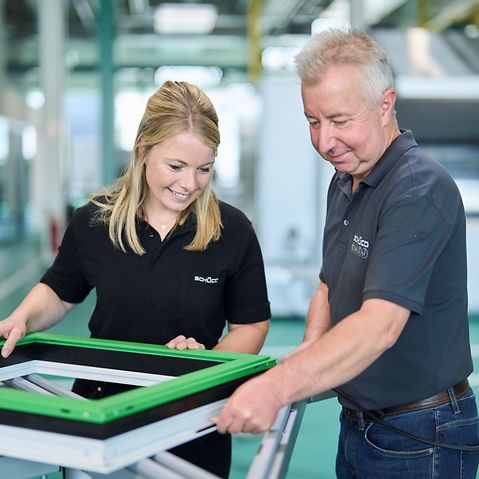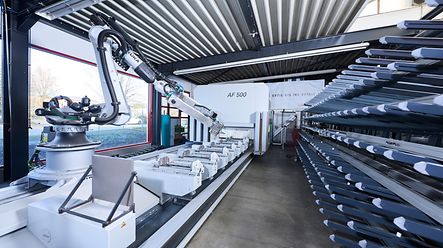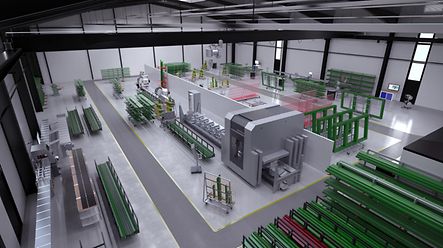
Lack of skilled workers
Lack of skilled metal fabricators
You have probably experienced this in your own company – the pool of applicants is becoming ever smaller and there are fewer skilled workers. What has caused this lack of skilled workers and what are the consequences? Schüco is here to support you with this problem and offers the perfect solution.

"Given the acute shortage of skilled workers in the metal construction industry, early implementation of automation and ergonomics in your operation is critical. This will enable you to work more efficiently and meet the challenges of the skills shortage in the long term."
Tina Diekmann, Head of Market Development & PMO Fabrication, Schüco International KG
Automation as a solution for the lack of skilled workers
The lack of skilled workers poses a serious problem for the fabrication industry. Fewer people are ready for the challenge of manual craftsmanship. The unemployment rate is also going down. This means that more and more people are choosing to find jobs outside of fabrication. At the same time, many skilled workers from the baby boomer generation are starting to leave working life and go into retirement.
One thing is clear: There will be a lack of skilled experts in the future. The question remains: how can you prevent or at least address the issue of the lack of skilled workers in your business?
As well as general measures such as training employees, the use of innovative technology and automation can play a decisive role in combating the lack of skilled workers.
Automation technology can reduce your team's workload and take on repetitive fabrication tasks. With Schüco machines, your employees have more capacity for work steps which require human knowledge and skills.
Robots and automation can also help to draw young talent towards a career in fabrication. The use of automation technology shows that you are investing in your company and can think and work innovatively. Modern technology attracts younger workers and increases your competitiveness.
Production that thinks ahead to your company's future
CNC (Computerised Numerical Control) processing is a computer-supported fabrication process which controls the movement of production systems by means of preprogrammed software and codes. CNC processing is used to control a variety of complex machines. Discover more in our
CNC machines category.
Start fabricating today with the RX LOAD 500: a self-sufficient robot cell consisting of a 5-axis Schüco CNC machine and the latest KUKA robot technology. This machine is your first step towards the automation of craftsmanship in your business.
Our services for our partners: CNC machines, automation technology and workshop planning

Automation technology
Automation technology can take over repetitive fabrication tasks.

CNC machines
Our CNC machines support fabricators in implementing sustainable processes, ensuring precision and efficiency during metal fabrication.

Workshop planning
Our customers receive an individual, personal and interactive consultancy service which optimises processes,
How a lack of skilled workers affects metal fabricators
Working overtime due to labour shortages
Working overtime due to labour shortages
As a metal fabricator, you increase production as soon as demand rises. If you don't have enough staff available, your employees may work longer shifts in order to deliver a project on time. While an increased workload may seem like a short-term solution, this is not sustainable. Having to work overtime can quickly result in unhappy employees and an exceeded budget, reducing the profitability of your company.
Delays and reduced quality
Delays and reduced quality
The pool of applicants today is small due to the low unemployment rate. There is a high degree of competition as numerous companies are on the search for competent workers. Businesses are therefore frequently forced to employ people who do not possess the required skills. Training and educating these employees takes time and can impact quality.
When capacity becomes a problem
When capacity becomes a problem
A continuing lack of skilled workers in your company can lead to delayed delivery times. Employees cannot work overtime for long periods and customers do not want to wait too long for their deliveries. In order to prevent a total breakdown, you are likely beginning to look at what tasks your overexerted company can still complete without raising the stress for your employees even further.
Many benefits as a registered user:
- Work material (e.g. tender specifications, CAD data, catalogues)
- Software & Tools
- Note content
- Direct contact to Schüco


